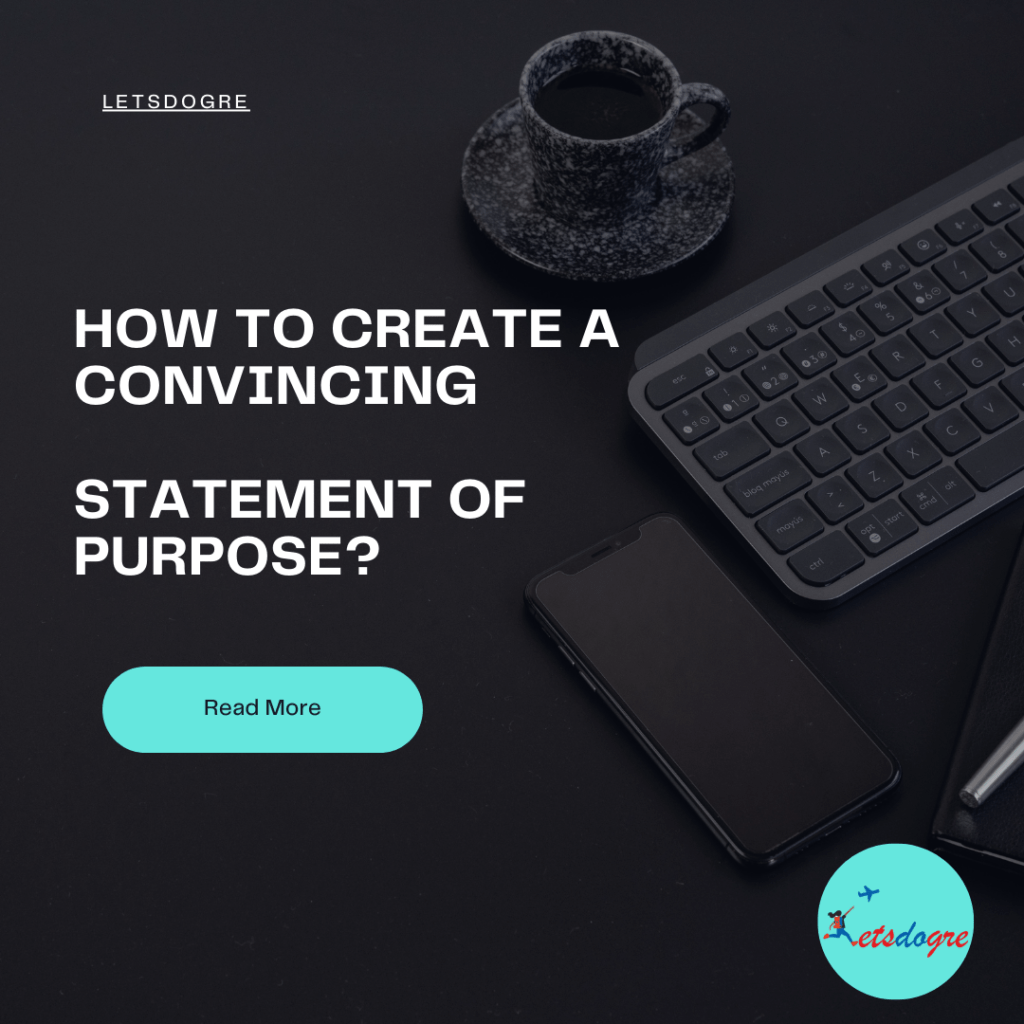
- February 14, 2024
- 12:04 pm
-
Views: 699
Statement Of Purpose Format
Writing a Statement Of Purpose might seem a little intimidating. But don’t worry; with a proper Statement of Purpose format and guidance to help you, drafting a stellar Statement Of Purpose will be child’s play.
In this blog, we will take you through the format of a Statement of Purpose, things that one should consider while writing his/her Statement of Purpose, and common mistakes to avoid during the process.
Why Do Universities Require a Statement of Purpose?
This is an obvious question you might have in mind. The universities have your resume, grades, list of extracurriculars, Letters of Recommendation, test scores, professional experience, etc. Then why does a strong Statement Of Purpose become essential?
Think about it this way: The pointers mentioned above are the quantitative aspects of your overall profile. Universities care about the qualitative areas as well. And that’s where a strong Statement Of Purpose comes into play.
Share your story
Through your Statement Of Purpose, you can share your story. Were you a state-level athlete? Share why the sport meant so much to you. Did you participate in a national-level olympiad and win a medal? Share your preparation story in brief and your key takeaways from the experience. Have a gap year in your resume? Tell them the reasons and how you grew as a person during that time period. Were you part of a club for a couple of years? Mention any incident that tested you and how you overcame that challenge. Want to tell the admissions committee something that you could not mention in your resume? You have all the space here.
And there is so much more to write in your Statement of Purpose. Remember, it is most likely that some other applicant will have some of the quantitative pointers in your resume and overall profile. However, it is in your Statement of Purpose where you can add a personalized touch.
Statement of Purpose Format
Now that we have established the importance of a strong Statement of Purpose let us have a look at the format that will best help you to share your story.
Introduction
Do not take this lightly. The first few sentences are very important for your Statement of Purpose. It is essential and extremely necessary to set a stellar premise to keep the reader hooked to the Statement of Purpose till the very end. You do not want the reader to lose interest in the beginning itself.
There are multiple ways to set the premise. Here are a few:
Self-Introduction
Start by telling something interesting and positive about yourself. Something that will make the reader want to know you further as a person and make him/her believe that you are a strong candidate best suited to attend their university.
A Past Incident
You can start by telling an actual story as well. It can be an incident that shaped you in a significant way, or it can actually serve as a backstory to why you are applying to a specific major or degree.
Suppose you are applying for a PhD in Biochemistry; then your introduction can have a brief incident of what motivated you to pursue a career in that field.
Key Takeaway
Bottomline, make sure that whatever you write in the introduction, make sure that it gels well with everything that you will write in the main body of your Statement of Purpose.
And with that, let us move to the longest section of a Statement of Purpose- The Main Body.
Main Body
What you write here depends on two factors:
- What the prompt for the Statement of Purpose has asked you to write and mention
- What do you wish to convey to the admissions committee
The first point is the most important. You can be asked to talk about your academic achievements, your grad school experience, and graduate studies, and, similarly, for undergraduates, you can be asked to highlight your past professional experience and elaborate on your plans.
If the prompt does not mention anything specific, then you can choose to talk about any of these aspects. You can have your permutations and combinations of these and mention them in your Statement of Purpose. Make sure that whatever you choose to write about, the overall structure is in perfect flow and gels perfectly with everything.
Let us take a look at all the aspects and what you can write about in each of them:
Academics
It can be beneficial to mention any significant academic project you might have done previously, if you have published any research papers in journals or presented any at a conference, if you have won any academic competition or olympiad, you can mention all these in your Statement of Purpose.
However, make sure not to sound arrogant while mentioning your achievements. Also, if any of these had any significant impact or posed a challenge that you overcame, you can choose to write about it as well.
Extracurricular Activities/Sports
Showing leadership skills and team spirit in extracurricular activities can definitely fetch your application some brownie points. And what better way than to mention it in your Statement of Purpose as well? Because the admissions committee will know you were the president of the Filmmaking club at your previous university, your Statement of Purpose is the space where you can share personal stories and incidents from your experience being in the club. If you have been playing a sport for really long, you can also write about it.
You can also share how much that particular extracurricular or sport means to you and has impacted you, why you love to pursue it, and maybe if you would want to continue it at the university you are applying to as well.
Professional Work Experience
Did you work at a company before, or did you intern for a firm before applying for admission? You can share your story and a few more details which you could not fit in the resume.
It doesn’t matter if you worked for a Fortune 500 company or a start-up that shut down. When there is professional work experience involved, there are always things to learn. You have to articulate and write them in a way that does full justice to your experience and all that you learned from it.
You can also mention if you had your entrepreneurial venture and all the challenges you faced along the way, how you kept the company team spirit high when the tide was against you, and how you made profits, if any.
Why this particular university?
Universities want to see your genuine interest in them and want to make sure that the applicant has done their homework about the university. You can research specific aspects about the university that prompted you to apply to it, like a course that they provide, professors you wish to study under, their research facilities, or anything else personal to you.
But remember to keep it subtle. While praising the university, make sure it sounds genuine. It should not convey that all you are doing is trying to butter-polish the admission committee just so that they can offer you admission.
Why this particular degree?
Universities prefer candidates who demonstrate a genuine interest in the course or degree they are applying for. Share your motivations for deciding to apply. However, remember that your bases demonstrate your love for the degree and the education it brings rather than for the rewards.
For example, suppose you are applying for an MBA degree. In that case, universities want candidates who have a passion for business management and can thrive in a business environment rather than someone who is in it only for the money that the degree will get you once you start working.
Future Plans
How do you plan to use the education that the university will provide you if you get accepted? Do you wish to study further, or do you want to take up a job, or do you wish to start your venture? There is no correct answer. You have to share what your next step will be genuine.
You can also divide your plans into long-term and short-term future goals. This gives the universities an overall idea of what they wish to achieve ultimately.
Gap Year
If you had a gap year for some reason, this is the best place to explain your circumstances and how you grew as a person during that time.
Conclusion
Conclude by summing up your overall Statement of Purpose in brief. Make sure that the conclusion aligns with whatever you have written so far. And keep it positive. It is always best to conclude on a positive note.
Things to remember while writing your Statement of Purpose
Word Limit
The word limit will mostly always be mentioned in the prompt. However, if nothing is mentioned, try to keep it two page long. The font size should be either 11 or 12.
Problem with longer Statement of Purposes
The admissions committee has to go through hundreds of Statement of Purpose during the admissions season. If they find a long one to read, they are likely to lose interest. Make it crisp and impactful.
Keep it subtle
It can be tempting to mention all the amazing things about you in your Statement of Purpose. However, remember to write it subtly. You do not want to sound like you are bragging in front of the admissions committee.
Write multiple drafts
Rome wasn’t built in a day. Similarly, a strong Statement of Purpose cannot be drafted in one go. You need to go through it time and again to perfect it. Remember, make every word count.
Make it as unique and personal as possible.
Last but not least, make sure that your Statement of Purpose portrays your unique abilities, capabilities, and achievements. Share personal anecdotes and stories that will make you stand out from the crowd.



